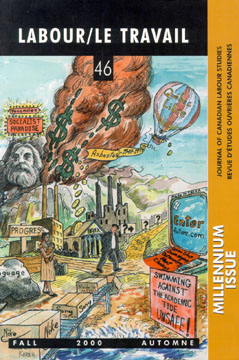Abstract
This essay provides a selective overview of the Canadian historiography on family. The roots of family history not only extend backwards much further than the "new social history" bom of the tumultuous 1960s, they are buried deep in several other disciplines, most notably sociology, anthropology, and demography, whose practitioners were concerned as much with the historical process of family change as with the state of families contemporary to their times. I consider how pioneering social scientists, by grappling with the family's relationship to structural change, historicized early 20th century family studies and offered up many of the questions, concepts, theories, and methods that continue to inform historical scholarship on families. Turning to the body of historical publications that followed in the wake of, and were often inspired by, the "new social history," I highlight the monograph studies that served as signposts in the field's development, especially for what they have revealed about the critical nexus of family, work, and class. The historiography mirrors the family's history: "family" consists of so many intricately plaited strands that separating them out is frustrating and often futile. I have attempted to classify this material both topically and chronologically within broad categories, but the boundaries blur so that most of these works could fit as comfortably in several others. Many of them, in fact, will be recognized as important contributions to fields such as labour, ethnic, women's, or gender history rather than as works of family history per se.
Résumé
Cet article donne un aperçu de l'historiographie canadienne sur la famille. Les racines de l'histoire de la famille non seulement reviennent en arrière beaucoup plus que la « nouvelle histoire sociale » née des années 1960, elles sont enterrées en profondeur dans plusieurs autres disciplines, notamment la sociologie, l'anthropologie et la démographie, dont les praticiens se préoccupaient du processus historique des changements de la famille ainsi que de la situation actuelle des familles contemporaines. Je considère comment les scientistes sociaux avant-gardistes, en étudiant les relations de la famille avec les changements structuraux, ont inclus dans notre histoire les études de la famille du 20e siècle et présenté de nombreux concepts, questions, théories et méthodes qui continuent à renseigner les chercheurs historiens sur les familles. En ce qui concerne les publications historiques qui ont suivi, la plupart étaient souvent inspirées par la « nouvelle histoire sociale ». Je tiens à souligner les études monographiques qui ont servi de points de repère dans le domaine du développement du champ, en particulier en ce qui a trait aux critiques essentielles de la famille, du travail et de la classe. L'historiographie reflète l'histoire de la famille dont la notion consiste en nombreuses subtilités qui séparent les unes des autres est souvent frustrante et inutile. J'ai essayé de classifier ce matériel à la fois topique et chronologique dans des catégories plus grandes, mais les limites se chevauchent et la plupart des oeuvres peuvent s'intégrer dans plusieurs catégories en même temps. En réalité, beaucoup de ces oeuvres seront reconnues comme des contributions importantes aux domaines divers tels que le travail, l'ethnie, la femme ou l'histoire du genre plutôt que comme des oeuvres de l'histoire de la famille uniquement.
